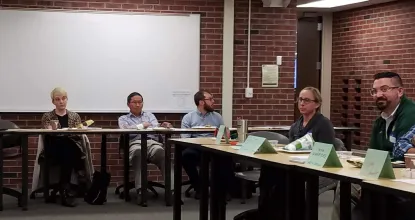Northern has a longstanding reputation for excellent teaching. As you join the ranks of NMU faculty, explore this page of New Faculty Central to learn about resources that support your teaching role and some specific teaching methods.
Support
There are many resources on campus to support your teaching. They include, but aren't limited to:
- The NMU Center for Teaching and Learning facilitates excellence in classroom and online instruction and promotes scholarship of teaching and learning by providing tools, professional development opportunities, and other supporting services. This includes consultation on teaching techniques and course design, supporting the NMU EduCat Learning Management System and other instructional technology, and supporting technology and furniture installed in NMU's learning spaces. The CTL is located in room 106 of the Harden Learning Resources Center. Visit the CTL website for more information.
The Teaching and Learning Advisory Committee (TLAC) is a standing committee of the Academic Senate that helps stimulate the creation of a campus culture that truly values, promotes, recognizes, and rewards excellence in teaching and learning. TLAC administers Conference Grants and NMU's Excellence in Teaching Awards. The committee collaborates closely with the CTL.
- The Lydia M. Olson Library provides in-class library instruction, course reserve services, distance library services, assistance locating materials, copyright guidance, and other valuable assistance. Visit the Olson Library website for more information.
- The Registrar's Office (RO) can provide you with assistance understanding the Family Educational Rights and Privacy Act (FERPA), which protects confidentiality of student records and gives students access to their records. The RO also provides information on grading scales and instructions for posting grades. Visit the RO website for more information.
- The Dean of Students Office (DSO) is focused on serving students, but is also a valuable resource for faculty. Students who self-identify as having a disability should be referred to the DSO's Disability Services office. If you encounter academic dishonesty issues in your classes, you should contact the DSO. During the course of interacting with your students, you may also observe troubling behavioral issues or learn important information that you don't know how to deal with. The DSO can help. Visit the DSO website to learn more.
Classrooms
NMU has a variety of classrooms that you may find yourself teaching in as well as many resources to choose from so that you can create the kind of learning space that will be most beneficial for students to learn your course content.
NMU has nearly 100 classrooms, not including laboratory spaces. A small number of these are specialized classrooms used exclusively by specific departments, but the vast majority of them are general use classrooms to which any faculty member may be assigned.
All general use classrooms have ceiling-mounted projectors, media players, a sound system, and connectors for hooking up your NMU laptop . Some rooms have additional equipment, such as document cameras, wireless display systems, dual projectors, and LCD panels for facilitating student group work.
These rooms range from 20-50 seat fixed seat classrooms to a 500 seat auditorium, with various sizes and configurations in between.
To get details about a room to which you are assigned, use the Classroom / Lab Search. For assistance with classroom technology, contact classrooms@nmu.edu or 227-2290.
Active Learning
Active learning can take many forms, but they all rely on the intentional engagement of students. Extensive research has shown that student-centered active learning techniques result in improved student understanding and improved student retention in the general student population and in underrepresented minorities.
The CTL can help you discover and use active learning teaching techniques that are a good fit for your courses.
NMU EduCat
Learning Management Systems (LMSs) are now as much a part of an instructor's tool set as books or dry erase boards. Northern's LMS is called NMU EduCat™. It runs on the open-source Moodle platform, so if you have used Moodle at another school, EduCat will seem pretty familiar. If you haven't used Moodle but have used a different LMS, such as Blackboard, Canvas, or Desire2Learn, it may take a little more adjusting, but you'll find that it has a similar set of online tools, including assignments, discussion forums, online testing, and a gradebook.
The CTL provides faculty with support for EduCat, including processing course requests, providing one-on-one assistance, and holding hands-on workshops. Visit the CTL website for more information about EduCat, including any upcoming workshops.
Teaching Online
NMU offers many online course sections each semester, has several online programs, and has committed to expanding online offerings. If you are interested in teaching online, it is likely that you will have that opportunity at some point in your career.
To ensure a high quality experience for both instructors and students, NMU has enacted, or is in the process of enacting, some requirements for both course design and preparation for students, faculty, and other instructors:
- Course Design – NMU subscribes to the Quality Matters (QM) Program, which provides a "nationally recognized, faculty-centered, peer review process designed to certify the quality of online courses and online components." NMU has implemented a stepwise process that increases the requirements for online course quality over the next few years, with the ultimate goal being to have all online courses meet essential QM standards.
- Instructor preparation – NMU instructors must be "Distance Qualified" before they can teach online. To become qualified, instructors complete required professional development. The specific requirements for completing Distance Qualification vary depending on the instructor's past online teaching experience. To learn more, contact the Center for Teaching and Learning.
- Student preparation – Before participating in any online course students are required to complete a self-paced, online tutorial module. The tutorial is available to all students through EduCat and can be completed at any time.
